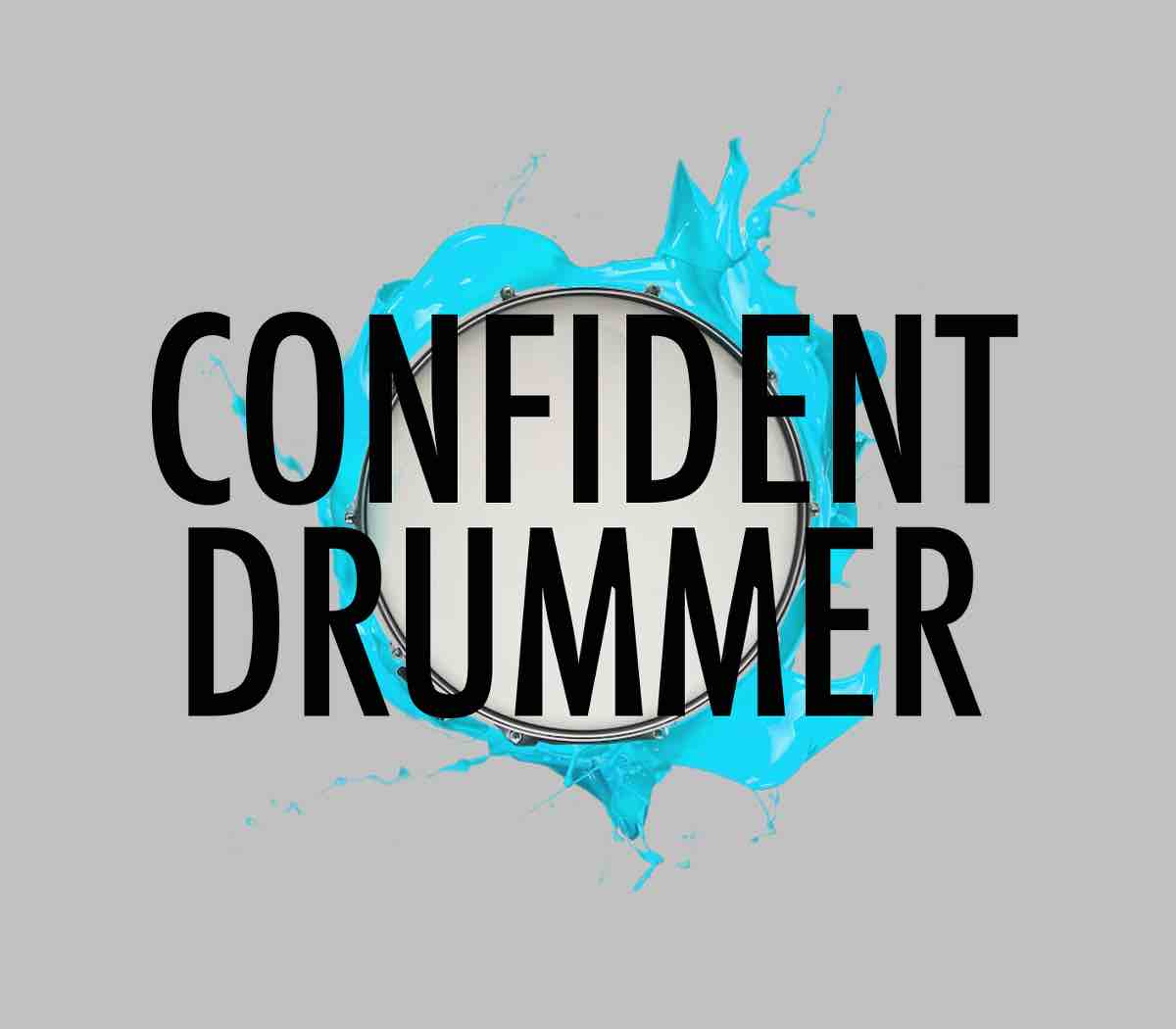10 ways to overcome your insecurities, also known as 10 ways to boost your confidence ;).
This is a topic that I really care about, as you can tell by the name of this drum portal.
First of all, let me tell you openly, I have always tended to feel insecure and doubt myself, especially in my first years as a professional drummer.
Now I clearly see how that struggle was a beautiful opportunity, which led me to work on myself and grow a lot as a person and as a musician.
To the point that I’ve learned a bunch of effective ways to feel pretty confident about myself. And that’s what I’d like to share with you today.
There’s a lot of pressure involved in being onstage or recording in a studio and dealing with all the kinds of people and demanding situations that come up in the music business.
The subject of insecurities is a big deal for anybody who is involved in some kind of performance, and needs to be addressed so that it doesn’t undermine the quality of what we do.
Confidence is our natural state. Confidence is not arrogance (which is also a form of uncertainty), is just the feeling of being adequate and able to meet the requirements of a situation.
It’s what remains when we don’t have any insecurities, and that’s why we are going to focus mainly on taking care of those.
The fastest and most effective way to solve any problem is to go to the root cause of it.
So many times we try to fix the effect, or go for a quick fix, and we end up facing the same situation over and over because the root cause is still there.
Here we are going to take the opposite approach, and go deep. In order to do so we are going to have to go all the way back to our ancestors. Not kidding 😉
To download a free PDF printable version of this article click here:
Where do our insecurities come from?
Human beings evolved in groups of about 150 individuals and so we are wired to be very sensitive to other’s opinions.
That’s because in that primitive social context being accepted or rejected literally meant the difference between life and death.
There wasn’t a society filled with countless new opportunities. If you screwed it up it was over for you.
That developed into the habit to worry, to question ourselves and to always try to make sure that the way others saw us was positive.
Those behaviours evolved over long periods of time in specific programs designed to keep us alive.
Anything that is related to survival bypasses our rational mind and makes us react in unconscious automatic ways.
That’s part of our ego, which evolved as a survival mechanism, and we have to deal with it.
The most important thing to understand is that while human beings have been around for more than a million years, civilization developed in a few thousand years, much faster than what’s required by evolution to drop what’s not needed anymore.
This is crucial to keep in mind, because it means that we have a brain wired to make us function and live in world that basically doesn’t exist anymore.
Even if certain mechanism are not as useful as in the past, we still have that programming going on inside.
So, with that being said, we need to face this important truth. We can never totally overcome insecurity, because it’s part of our nature.
And it will still be until a period of time long enough allows evolution to do its job and discard what is now an unnecessary part of our functioning.
Evolution is very efficient, and so it will be eliminated. But since it takes a long time, and since for now it’s still in place, we need to deal with it. And remember that it’s normal, and it’s a constant activity of the ego.
The effects of this activity are that we keep questioning what we do, and make sure it’s ok, and good enough, because if it’s not, that could mean we would not survive.
Even if that was especially true in the past and not anymore, the ego doesn’t know that.
Psychologists say that that’s the main cause of all our irrational behaviours and feelings.
And insecurity is definitely one of those, since we feel it even when there’s no logical reason for it.
It’s one of the main effects we see as a result of that unconscious automatic activity, and it makes our inner dialogue and self perception very critical, anxious and doubtful by default.
This practically means that, as we said, we tend worry and feel insecure and doubt ourselves all the time.
Most people live in a perpetual state of subtle anxiety, as if something bad is about to happen anytime.
So, even if confidence is our natural state, this self talk, and automatic reactions, thoughts and emotions, keep us out of that state a lot of the time.
Yes, today we still need to be accepted and we still need to fight for our survival.
But that’s extremely rare and the dangers of the modern age are nothing compared to those we are built to expect and overcome.
Yet, the mind acts as if those dangers are still fully there.
This premise is necessary because we need to realize we are not crazy and that the first step in order to overcome our self doubt is to accept it as part of our condition.
Then we can work on optimizing the situation. But we can’t fight the ego’s nature.
We can work with it, and improve the situation by doing the right things.
Anybody who claims he or she has no insecurities is either lying, or so unconscious that he doesn’t realize that they are there, or unwilling to admit it to him/herself.
I now understand human nature deeply enough to be able to tell you this: even the toughest and most successful guys have insecurities.
Personally, I still have a few of those, and they sometimes come up again.
What’s different now is that I know how to handle them. They have become a non-issue.
So with this being said we have already found the first key to deal with insecurities: acceptance.
Since what we focus on grows, if we focus on our insecurity, which is, we resist it and tell ourselves that it is wrong and so on, we give it power. And so we will experience more of it.
But if we accept it and understand that it’s normal to feel it and even welcome it as a natural part of life, it will diminish and almost disappear with no effort.
Accept it, don’t fight it, it’s only human to have insecurities and everybody has them.
Even just this could be enough to relieve you of some of your self doubt.
Talking about drumming, we tend have a few common insecurities. Stuff like:
- I need to always sound great.
- Other drummers are judging my playing.
- I’m not that good.
- I don’t know if I can pull this off.
- I hope I don’t mess up.
- Will I be good enough?
Sounds familiar? Well, we all know how these thoughts comes up.
They all come from the same inner state of doubting ourselves and not trusting ourselves, and they show up mainly through our inner dialogue which then leads to our feelings of lack of confidence.
See? We have now gone deep enough that we can work on the root cause. If we handle that, the problem is solved.
So now let’s see a few practical things we can do to deal with this situation effectively.
1- Do the homework, be prepared, be ready. This doesn’t mean we become obsessive of course, because that would lead to being over-prepared and anxious about the task at hand.
But if we have done the homework and we know the music we are gonna play inside out, then our mind will be a lot more calm and confident about the performance.
Doing the homework also means many different things. It means being technically proficient, having lots of experience, having a good knowledge of the style of music involved, having the right gear and so on.
Having taken care of all these will help us to feel more confident.
2– Accept the worst case scenario. This is a great technique, related to the irrational nature of our lack of confidence.
Once we clearly see and bring to awareness the worst thing that could happen, we realize that actually we could definitely deal with it.
It wouldn’t be that big of a deal. And 99% of the time that’s not even close to come true.
We see that the uneasiness was caused by lack of clarity about our mental imagery.
3- Focus on what you control and let go of what you don’t control. Take care of all the details, have a positive attitude, show up ahead of time, stay relaxed, don’t be in a rush.
Then don’t cling. The way to get it is to not need it. Focus on what you control by giving yourself a positive and constructive goal that you have the ability to manage, like ‘I’m going to focus on learning and being better thanks to what I learn with this performance’.
You see? A goal like this takes away all the pressure of perfectionism and needing things going your way.
Eliminate fear and failure by focusing on learning and on the process, not on the specific outcome.
As a general rule, always keep in mind that you never control other people. You only control yourself.
So don’t give to anything external the power to validate you. You choose to put your value in the fact that you are being authentic and expressing yourself and being true to your art.
You are a good drummer because you are giving your best, not because you are perfect or others judge you positively. You never control other people’s opinion of you, no matter how hard you try.
You can only control how you judge yourself.
4- Face your fears and see that there’s nothing to fear. This is also related to irrational feelings coming up.
We’ve all had the experience of fearing an event and then noticing how easy it was to actually go through it.
That’s because fear is largely an illusion, created by the ego to protect the image we have of ourselves and our sense of security.
Some time ago I was touring with a band and before an important show the guitar player was pretty anxious and worried about his performance going well. In spite of being an accomplished and excellent musician.
He decided tho take a pill to calm down.
That’s exactly the opposite of facing fear. By doing so, first of all he went for the quick fix, which means, as we said, that he only fixed the effect and not the cause of it’s anxiety.
The next time the situation is exactly the same. A pill doesn’t help, because it’s an external, shallow, temporary solution.
And all good and permanent solutions and internal.
Second of all, he gave to his fear the power to control his behaviour.
Which is exactly what fears try to do. Since they are illusions, if you avoid them, they become bigger and bigger.
The only way to see that there is nothing to fear, and to take your power back, is to face them. I’m not saying that it’s easy to do. Just try and see what happens.
5- Review in your mind all the times you were able to do it. As we said the mind gets worried and doubtful automatically, and often irrationally.
Which means the insecurity is not necessarily related to a lack of skill on our part.
That’s why the most helpful thing we can do, concretely, is to gain more experience, so that we will have lots of reference memories to draw from, which will prove us that we can do it.
Get as much experience as you can, doing the thing that makes you insecure.
If it’s being onstage and you suffer from stage fright, after 50 shows playing in front of an audience will be the most natural thing for you.
6- Visualize things going perfectly. Spend time prior to the event, situation, performance, consciously visualizing it going perfectly.
There’s a host of techniques that work beautifully to achieve this. You can use affirmations, visualization, mental rehearsal.
It doesn’t have to be complicated. The key is that even if you use a simple visualization, you focus on the feelings, the emotions you feel, as if everything is going as you want, right now.
And you focus on imagining as many details as possible. Since the unconscious mind cannot distinguish between a real situation and a vividly imagined one, it will make you feel like it actually went that way.
And that’s what will emerge later on, in the actual situation.
7- Surround yourself with positive and inspiring influences. We don’t only feed ourselves by eating. We nourish ourselves also with what we feed all of our senses.
So if we turn off the news and all kinds of notifications, go on a social media fast, and instead we listen to our favourite and most inspiring music and drummers, or we read a great interview before going onstage, we will feel a lot more inspired and a lot less trapped in our heads.
The thoughts we think, the images we see, even the emotions we feel are mostly coming up automatically from past conditioning.
That means that they can be reprogrammed as we like, by repetition. Knowing this gives us the power to eliminate negative influences and look for positive ones, and stay in touch with those for long enough that our automatic programming gets more and more positive and constructive.
If you feel this sounds a bit too much like we almost function like robots, do some research about the way the unconscious mind works.
8- Focus on what’s really meaningful to you. Your passion, expressing yourself, the groove, the emotions, the music.
We can only focus on one thing at the time. Literally our minds cannot hold two thoughts at the same time. So if you want to make sure you have no negative thought, just focus on positive ones, consciously.
And the best ones to remind yourself of, are the ones related to the profound reasons why you play the drums.
Why you love drumming and music so much, and what drives your passion.
That will put you back in touch with the part of you that sounds great and uninhibited.
As soon as you get back in touch with how much you love music, everything else will take care of itself.
9– Meditate, observe your unconscious, stay present and see what it’s doing.
Have some kind of relaxing routine or workout: deep breathing, yoga, or actual meditation.
An unquiet mind, a restless mind, a tense mind is always insecure. A quiet mind is always confident.
The ego is running under the radar most of the time.
What we can do if we meditate is observing what it does and catch it in real time and notice the self doubting as it happens, so that we can defuse it before it makes any damage.
Also, by meditating regularly, it will be less likely that the mind sets off such thoughts.
The more present we are, the less insecurities we will have. Meditation brings us back to that natural state we mentioned at the beginning, in which the are completely confident and at peace.
10- Notice the positive side of insecurity. Emotions are very strong and accurate indicators of what needs to be done.
Insecurity can be a powerful motivator to make us want to improve, practice more and develop into great musicians.
Although we don’t want to make this a way to motivate ourselves negatively, we can use it to focus on doing the right thing.
We all have a part of us that knows what’s the right thing to do, no matter how scared or insecure we feel.
When we do what we know we should do, our self-esteem rises, and when our self-esteem is high also our confidence is high. Trust your instinct and gut feel.
When you go with what that tells you, you immediately feel more confident.
As you can see, once you have the tools to deal with a certain condition, the solution is very easy.
The solution is always out there, somewhere in the environment, there’s always someone that has already figured it out.
All we have to do is to look. The deeper we look, the more relevant are the answers that we find.
I hope this helps!
As you can tell I love these subjects, and I believe psychology and awareness are crucial to being a good drummer.
I have written a whole book about all these dynamics and the inner aspects of being a musician and actualizing our potential as drummers.
If you are interested and would like to learn more you can visit this page:
‘Actualized Drummer – Paths To Reach Your Full Potential’
Also, if you want to discover how to feel more confident and inspired about your career as a drummer, you may want to read this free booklet:
Drumming Career – Tips and Inspiration




















